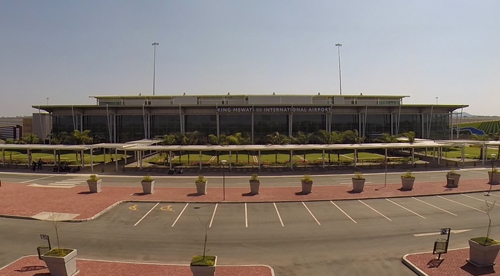
On March 7 this year King Mswati III of Swaziland officially opened the new international airport, also known as King Mswati III. A key component of the Millennium Development goals (MDG) programme, the $280 million project is not unattended by controversy, but is seen as essential if Swaziland is to make the most of its geographical advantages and become a mini hub within southern Africa, providing a complementary role to OR Tambo Airport only a couple of hundred miles to the west.
Like all civil aviation activity in Swaziland, King Mswati III International Airport is administered by the Swaziland Civil Aviation Authority (SWACAA). This organisation was established in 2009 as a parastatal organisation, with the mandate to provide, on a commercial basis, air transport services and the regulation of civil aviation activities in Swaziland in accordance with international standards.
A robust regulator was much needed, as Swaziland was not up to speed with international practice, explains Director General Solomon Dube. “The State of Swaziland had been audited in July 2007 under the Universal Safety Oversight Audit Programme agreed to by International Civil Aviation Organisation (ICAO) member states in an assembly of 2004. The overall level of effective implementation (LEI) of ICAO standards and recommended practices was found to be 16.7 percent.” Clearly this would not do. A corrective action plan (CAP) detailing what Swaziland needed to do to correct the deficiencies found by the audit was submitted to ICAO and Dube, who had been involved in developing the CAP, was appointed to lead the newly set up authority.
Dube is the only executive member of the Board. As managing director of SWACAA he presides over Executive Committee (senior management) meetings. “As civil aviation is a very technical and heavily regulated global industry,” he explains, “it became necessary to establish an autonomous body that would focus on the growth and professional management of the industry, with the Minister of Transport as its political head.” The inauguration of the authority set the stage for modernisation of civil air communications in Swaziland, and by far the biggest task in hand was the construction of the new Sikuphe International Airport, now renamed King Mswati III, as a fitting gateway to the country for the tens of thousands of tourists who fly in annually to visit Swaziland’s game parks and the nation's rich culture.
The new airport can accommodate fully laden Boeing 747 Jumbo jets and other large aircraft like the Boeing 777 and Airbus 340. KMIII is located on flat terrain with good visibility and is a strategic gateway to Swaziland and the surrounding region for tourism and business. The new airport will boost Swaziland tourism because the old airport in Matsapha could receive only regional aircraft. Tourists used to have to land in South Africa and take a bus to get to Swaziland, and cargo from all over the world was dropped in South Africa and had to be brought in on trucks or by rail.
This is a thoroughly 21st century facility that currently has more bells and whistles than the amount of tourist traffic – currently around one million a year – really requires. The 7,000 square metre passenger terminal can handle and process about 300 passengers an hour, while the parking area caters for 200 vehicles. The three levels of the terminal building house, from the bottom up: the passenger concourse and baggage handling facilities; the airport staff offices; and on the first floor a further passenger concourse and arrival and departure lounges.
KMIII is now the Kingdom’s major international hub connecting Swaziland directly with the world. The airport is designed to accommodate projected future air passenger and cargo demands for the region, and incorporates terminal buildings, a VIP passenger lounge, air navigation and ground handling equipment, and all associated airport operations equipment. Despite a slow start two airlines have now confirmed operations at the airport with additional flights to Johannesburg, South Africa and new routes directly to Durban, Mozambique and Cape Town.
The former international airport will now be used for other ventures since the new facility can cope with all the international and regional traffic for a long while to come, continues Solomon Dube. “The plan is to develop Matsapha Airport into an army base and general aviation facility. There is also a viable proposal on the table to develop an aviation training centre there – Swaziland is the ideal place for pilots to learn their skills because of our quiet skies!”
Though SWACAA will now have the job of attracting more international carriers to join in with Swaziland Airlink and choose Swaziland as a destination or stopover, further development is already being planned, says Dube. “Phase 1 was just enough to enable aircraft to land on a certified airport. Phase two is planned but will only be implemented once there is a business case in response to traffic demand. Swaziland is close to the tourism nodes of South East Africa. It is peaceful and friendly with all African countries. The potential exists to create an alternative gateway for tourists to the SADC region and more specifically to the East Three Route developed by the tourism departments of Swaziland, Mozambique and South Africa. There is also a substantial number of people from East Africa who visit Swaziland for training purposes. It is expected that as Africa increases its use of air transport, there will be an increased number of direct flights between cities.”
But tourism is the sector that must at all costs be targeted, he continues: “In order to attract foreign direct investment and foreign exchange, overseas visitors to the country and the region need direct access. The new airport provides that access and does it in a simple but elegant manner to the highest international standards.”
SWACAA has been tasked by the government to make sure that ICAO’s CAP is fully implemented and good progress has already been made towards raising the scores. “We have led the implementation and also roped in experts from developed countries and ICAO Technical Cooperation Bureau to give practical on job training to our inspectors. An ICAO Validation Mission is planned for April 2015. And we are implementing compliance with the ICAO safety management systems standard, which encourages safe working practices among employees at all levels.
Strategic objectives for SWACAA over the next twelve months include growing traffic at KMIII, and developing the entire air transport industry in Swaziland, not forgetting the Nhlangano airstrip in the southern part of the country, which is predominantly used by the forestry farming community. Dube would also like at least ten percent of the 1.2 million population of Swaziland to start using air transport .He would also like to see an increasing flow of goods and cargo, in both directions, through the airport. All of these objectives are brought into focus by the presence of the new airport, he says, and SWACAA will continue to work tirelessly to deliver them.
DOWNLOAD
 SWACAA-Africa-T&L-Nov14-Bro-s.pdf
SWACAA-Africa-T&L-Nov14-Bro-s.pdf













